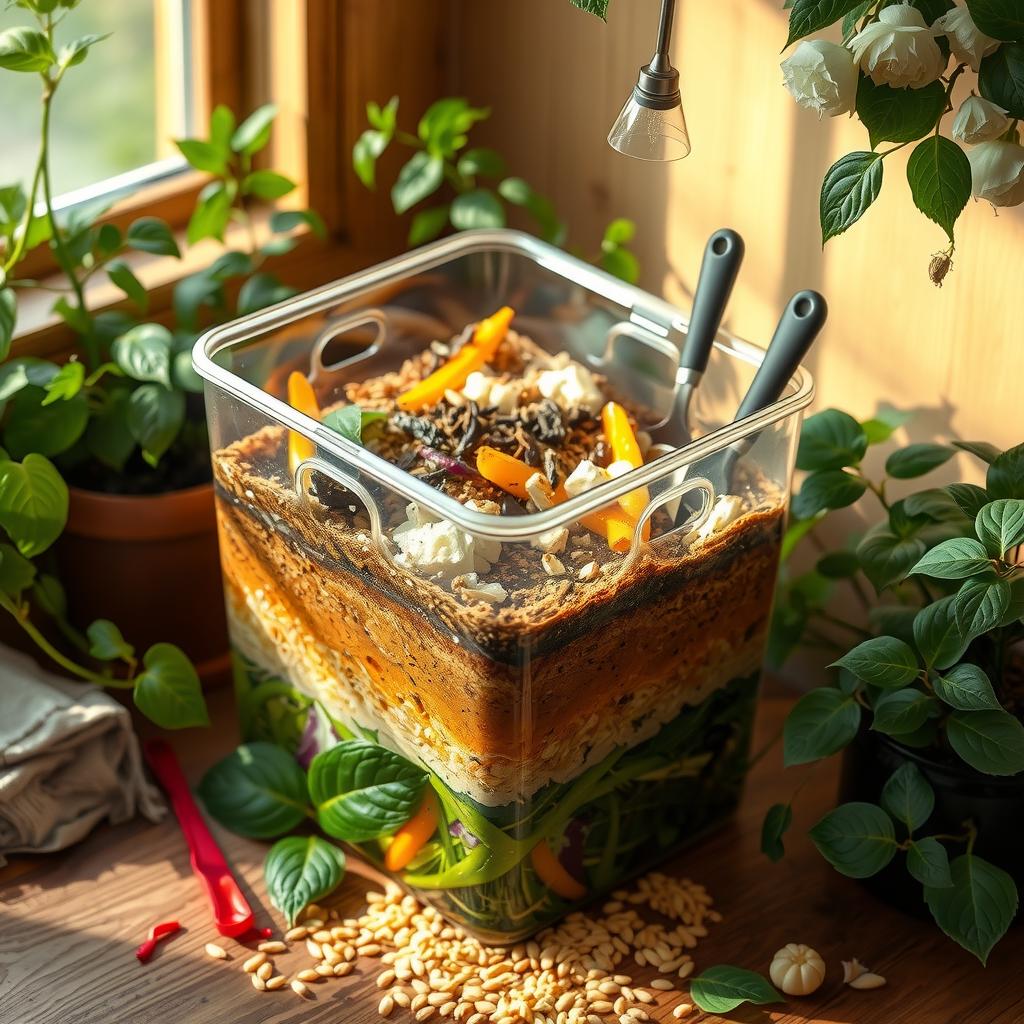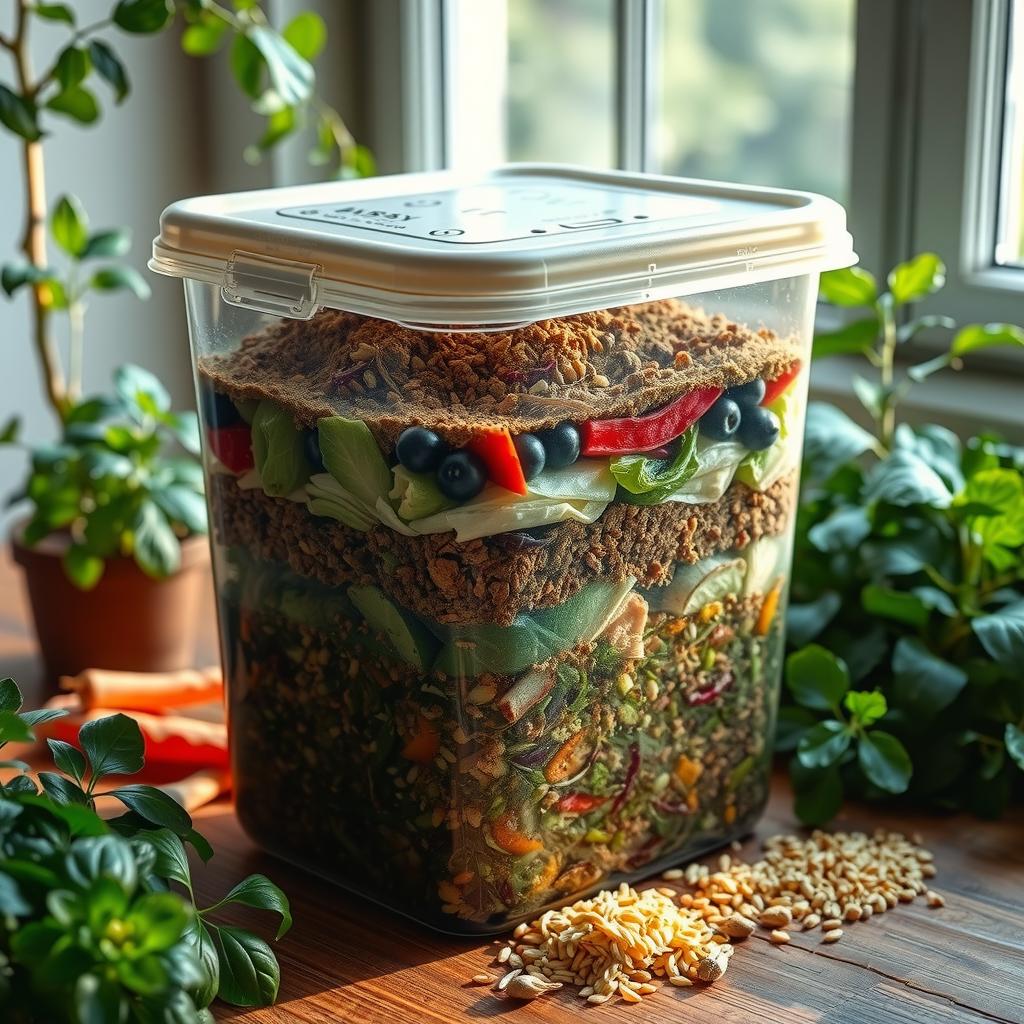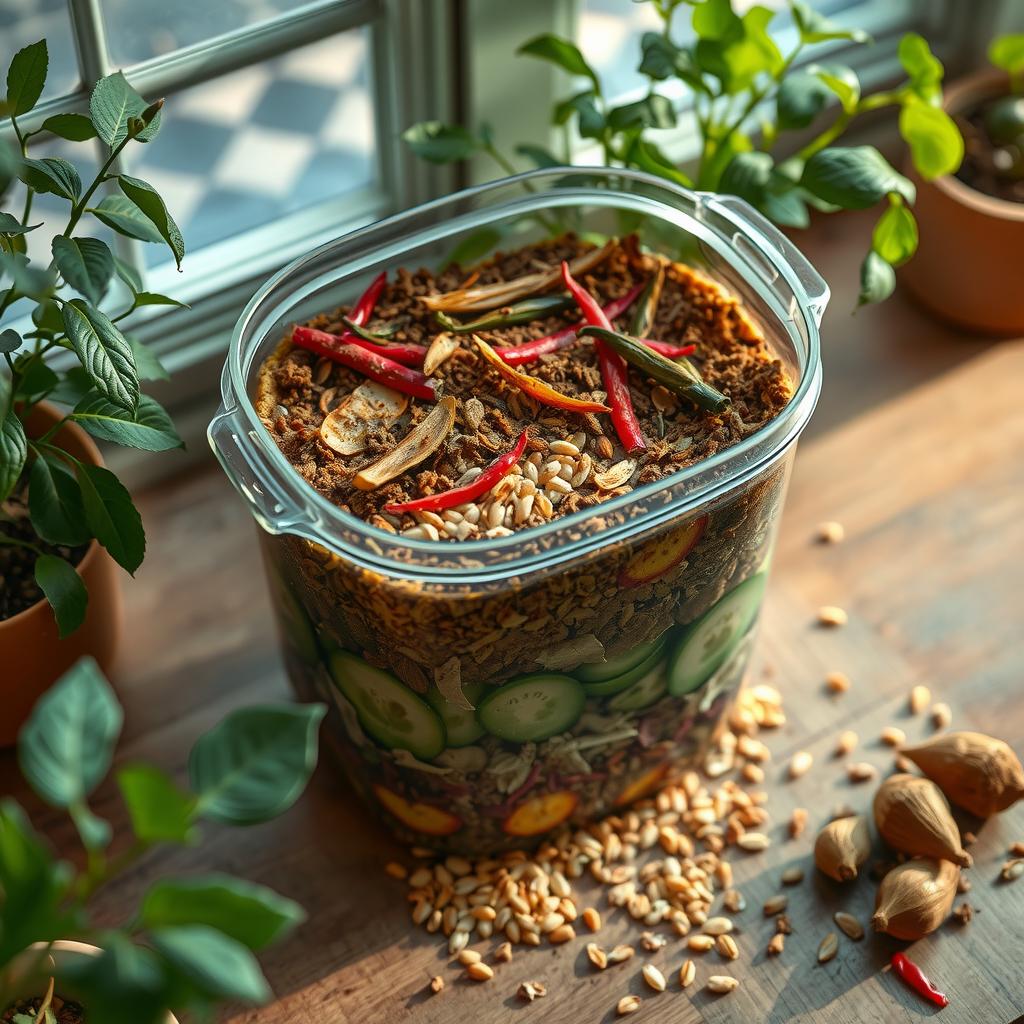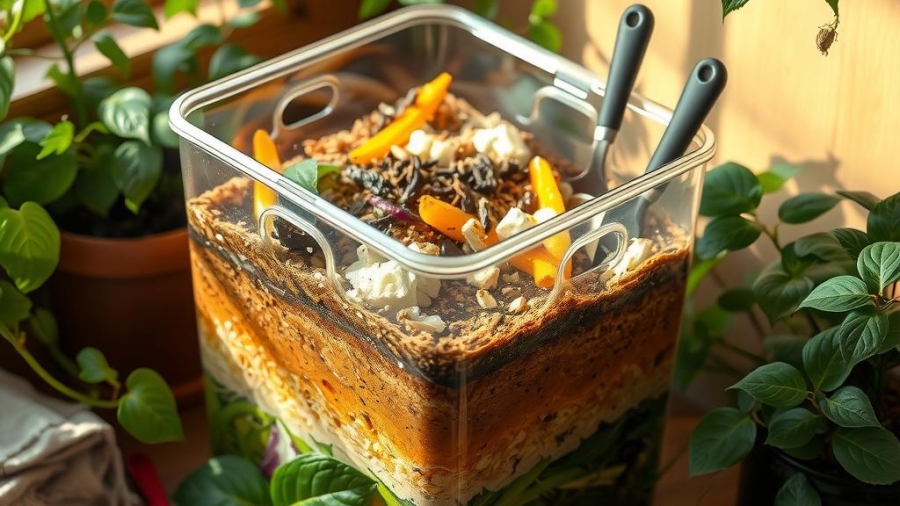In today’s world, the challenge of managing organic waste effectively is more pressing than ever. With landfills overflowing and environmental concerns on the rise, individuals and families are seeking innovative solutions to reduce their ecological footprint. One promising method that has gained traction in recent years is Bokashi composting, a unique approach that transforms kitchen scraps into nutrient-rich compost through fermentation rather than traditional decomposition. This eco-friendly solution not only minimizes waste but also supports sustainable gardening practices by significantly improving soil quality.
The core value of this blog post lies in its practical guidance for setting up a Bokashi composting system. Readers will discover how easy it can be to implement this system at home, turning everyday organic waste into valuable resources for their gardens. By harnessing the power of fermentation with the Bokashi composting method, individuals can contribute to effective waste management while reaping numerous composting benefits, such as enhanced soil fertility and reduced greenhouse gas emissions.
As we delve deeper into this article, readers will find step-by-step instructions on establishing a successful Bokashi composting system, addressing common obstacles along the way. From selecting an appropriate container to understanding the role of Bokashi bran in accelerating decomposition, each section aims to empower readers with knowledge and confidence in their sustainable gardening journey. The ultimate goal is not just about reducing waste; it’s about fostering an environmentally conscious lifestyle that promotes healthful living and nurtures our planet.
Join us as we explore how setting up a Bokashi composting system can transform your approach to organic waste disposal while enhancing your garden’s productivity—because every small action counts towards sustainability!

Key points:
-
Understanding Bokashi Composting: This innovative method of waste management utilizes fermentation instead of traditional decomposition, allowing for rapid recycling of kitchen scraps. The Bokashi composting system can handle a diverse range of organic materials, including items typically avoided in conventional composting like citrus peels and cooked leftovers, making it an efficient solution for households aiming to minimize their carbon footprint.
-
Benefits of the Composting System: By integrating the Bokashi composting technique into their routines, individuals contribute significantly to reducing methane emissions from landfills—a major factor in climate change. Additionally, this system accelerates the production of nutrient-rich humus that enhances soil health and fertility without relying on chemical fertilizers. Such advantages illustrate how effective waste management practices can lead to sustainable gardening outcomes.
-
Empowering Sustainable Practices: Adopting the Bokashi composting system empowers individuals to take charge of their organic waste while fostering healthier ecosystems in their gardens or community spaces. As more people engage with this eco-friendly solution, they not only improve soil quality but also participate actively in a larger movement toward sustainability—demonstrating that every small action counts towards building a greener future.

Understanding Bokashi Composting: The Science Behind Fermentation
Exploring the Innovative Process of Bokashi
Bokashi composting represents a transformative approach to waste management that diverges significantly from traditional methods. At its core, this Bokashi composting system utilizes an anaerobic fermentation process, allowing for the effective decomposition of organic waste without the need for aeration. Unlike conventional composting—which relies on aerobic bacteria and requires regular turning—Bokashi employs beneficial microorganisms that thrive in oxygen-free environments. This unique fermentation process not only accelerates decomposition but also minimizes unpleasant odors often associated with rotting food scraps.
One notable aspect of Bokashi is its ability to break down various types of organic materials, including cooked foods, dairy products, and even meat—items typically avoided in standard compost piles due to potential pests or odor issues. By using a specialized mix of inoculated bran (often containing wheat bran fermented with effective microorganisms), the Bokashi composting system promotes rapid microbial activity that transforms kitchen scraps into nutrient-rich pre-compost within just two weeks. This pre-compost can then be buried in soil or added to traditional compost systems, enriching them further while enhancing overall soil improvement.
The science behind this innovative method lies not only in the fermentation itself but also in how it contributes to sustainable gardening practices. When organic waste undergoes anaerobic digestion through Bokashi processes, it becomes more bioavailable for plants once incorporated into the soil. As a result, gardeners can enjoy improved crop yields and healthier plant growth thanks to enhanced nutrient availability—a direct benefit stemming from efficient waste management techniques offered by the Bokashi composting system.
Moreover, adopting this eco-friendly solution aligns perfectly with global efforts toward sustainability by reducing landfill contributions and greenhouse gas emissions generated by decomposing organic matter. Traditional landfilling often leads to methane release—a potent greenhouse gas—but through mindful practices like Bokashi fermentations at home or community gardens alike help mitigate these environmental impacts while fostering responsible consumption habits among individuals.
A distinctive advantage provided by Bokashi is its inherent speed; where typical compost may take months before it’s ready for use as rich mulch or fertilizer base layer beneath garden beds—or perhaps even longer if poorly managed—the Bokashi composting system’s cycle completes much quicker overall when combined effectively with existing soil structures post-fermentation.
In summary, understanding how the science behind fermentation underpins successful outcomes within sustainable gardening contexts emphasizes why many are choosing innovative solutions such as bokashis over older-fashioned alternatives today! The synergy between cutting-edge agricultural methods combined alongside traditional techniques fosters greater resilience within our ecosystems leading towards holistic approaches benefiting both people & planet alike now—and well into future generations ahead who seek eco-conscious living choices throughout their daily lives!

Setting Up Your Bokashi System
Understanding the Basics of Bokashi Composting
The Bokashi composting system is an innovative method that transforms organic waste into nutrient-rich compost through fermentation, rather than traditional decomposition. This process involves layering kitchen scraps—such as fruit and vegetable peels, coffee grounds, and even meat—into a sealed container along with a special bran inoculated with effective microorganisms (EM). Unlike conventional composting systems that can be smelly and slow to break down materials, Bokashi is virtually odorless when done correctly. The key lies in ensuring an airtight environment which not only prevents foul odors but also speeds up the fermentation process. By capturing the essence of this eco-friendly solution, individuals can manage their household waste sustainably while significantly improving soil health for gardens or potted plants.
Step-by-Step Setup Guide
Setting up your own Bokashi composting system begins with choosing the right container; any airtight bin will do, although specialized Bokashi bins are available for optimal results. Begin by adding a layer of dry material such as shredded newspaper or leaves at the bottom to absorb excess moisture. Next, start layering in your organic waste while sprinkling it generously with Bokashi bran after each addition. It’s important to pack down each layer firmly before sealing the lid tightly to ensure no air enters until you’re ready to empty it out. Over time—typically around two weeks—the mixture ferments without decomposing fully, creating a pre-compost product rich in beneficial microbes ready for burial in soil or further processing into finished compost.
Benefits of Using a Bokashi Composting System
One of the standout features of using a Bokashi composting system is its ability to handle diverse types of food scraps that traditional methods often reject. From citrus rinds to leftovers containing protein and dairy products—all can be processed effectively without attracting pests or causing unpleasant smells typical in standard outdoor heaps. This versatility makes it an excellent choice for urban dwellers who may have limited space for traditional gardening practices yet wish to contribute positively towards waste management efforts at home. Moreover, users quickly discover significant benefits like enhanced soil improvement once they add their fermented mix back into their garden beds; nutrients from fermented foods stimulate healthy plant growth while enriching microbial life within soils.
Emphasizing Sustainability Through Efficient Waste Management
Embracing the Bokashi composting system aligns perfectly with sustainable gardening practices aimed at reducing landfill contributions while simultaneously enhancing personal green spaces’ productivity levels over time! This approach allows individuals not only efficient management solutions regarding household organic refuse but also fosters environmental stewardship by turning what was once considered ‘waste’ back into valuable resources—the very definition of circular economy principles applied on domestic scales! As readers explore these facets surrounding eco-friendly solutions, they’ll recognize how integrating such systems cultivates healthier ecosystems both indoors where they produce less garbage—and outdoors where flourishing gardens thrive thanks largely due diligence taken during thoughtful recycling endeavors made possible via innovative techniques like those offered through Bokashi.
The Environmental Impact of Bokashi Composting
Unleashing the Power of Waste Reduction
The Bokashi composting system stands out as an innovative solution for managing organic waste while delivering significant environmental benefits. Unlike traditional composting methods, which often require extensive space and time, the Bokashi method employs anaerobic fermentation to transform kitchen scraps and other organic materials into nutrient-rich soil amendments. This process effectively reduces landfill contributions by diverting food waste from disposal sites—an issue that plagues many urban areas today. When organic waste decomposes in landfills, it generates methane gas, a potent greenhouse gas contributing to climate change. By utilizing the Bokashi composting system, households can significantly minimize their ecological footprint while promoting more sustainable waste management practices.
Enhancing Soil Health Through Bokashi Composting
A Natural Boost for Sustainable Gardening
Another remarkable advantage of using the Bokashi composting system is its ability to enhance soil health substantially. The fermented material produced through this method contains beneficial microorganisms that enrich garden soil with essential nutrients, improving its overall structure and fertility. This creates a robust foundation for sustainable gardening practices; healthier soils lead to better plant growth and increased resilience against pests and diseases. When applied directly to gardens or mixed with existing soil, Bokashi-treated matter not only nourishes plants but also fosters biodiversity within ecosystems by attracting a myriad of beneficial organisms such as earthworms and microbes crucial for maintaining ecological balance.
Eco-Friendly Solutions Through Bokashi Composting
Revolutionizing Waste Management Practices
Incorporating the Bokashi composting system into daily life offers individuals an eco-friendly alternative that aligns perfectly with modern sustainability goals. As more people become conscious about their impact on the environment, solutions like Bokashi empower them to take tangible steps toward reducing waste generation at home level effectively. This closed-loop approach allows users not only to recycle food scraps but also transforms them into valuable resources—thus illustrating how responsible waste management can contribute positively towards achieving zero-waste ideals in communities worldwide. Moreover, embracing this method promotes awareness about organic recycling’s role in combating climate change while fostering a culture of environmental stewardship among participants who engage actively in these transformative practices.
In a world increasingly burdened by waste, the Bokashi composting system presents an effective solution for individuals looking to transform their kitchen scraps into nutrient-rich soil amendments. This innovative approach utilizes fermentation rather than traditional decomposition, allowing households to quickly recycle food waste while significantly reducing their environmental footprint. By adopting this eco-friendly method, users can divert nearly all organic waste from landfills and contribute positively towards sustainable gardening practices.
The Bokashi composting system stands out due to its simplicity and efficiency in managing various types of organic waste that conventional composters often cannot accommodate. Unlike typical systems that require careful aeration and layering, Bokashi is odorless and can handle materials such as citrus peels or cooked leftovers with ease. Furthermore, this unique composting technique not only expedites the breakdown process but also enhances soil quality through improved microbial activity. With minimal effort required from the user, it becomes clear how engaging in Bokashi offers multiple benefits for both personal gardens and broader ecological systems.
As gardeners strive for healthier soils without relying on chemical fertilizers, integrating the Bokashi composting system becomes essential for cultivating thriving ecosystems in backyards or community gardens alike. The benefits extend beyond mere convenience; by using this fermentation-based approach to organic waste management, individuals can help reduce methane emissions—a significant contributor to climate change—while creating rich humus more rapidly than ever before. For those eager to make a difference in their environmental impact while reaping remarkable rewards through improved soil health, embracing Bokashi is indeed a practical choice.
FAQs:
Q: What types of food scraps can I use with the Bokashi composting system?
A: The Bokashi composting system is versatile and allows you to use a wide range of kitchen scraps including vegetable peels, fruit skins (even citrus), cooked leftovers, grains, dairy products, and small amounts of meat.
Q: How does the Bokashi method differ from traditional composting?
A: Unlike traditional methods that rely on aerobic decomposition requiring aeration and layering techniques—making them suitable mainly for plant-based materials—the Bokashi composting system employs anaerobic fermentation which handles diverse organic matter efficiently while being odorless.
Q: What are some key advantages of using a Bokashi composter?
A: Adopting the Bokashi composting system results in numerous benefits such as faster recycling of organic waste into nutrient-dense material suitable for enriching soil quality; it reduces landfill contributions thereby curbing methane emissions; plus it fosters better microbial life within your garden ecosystem promoting sustainable gardening practices overall.
